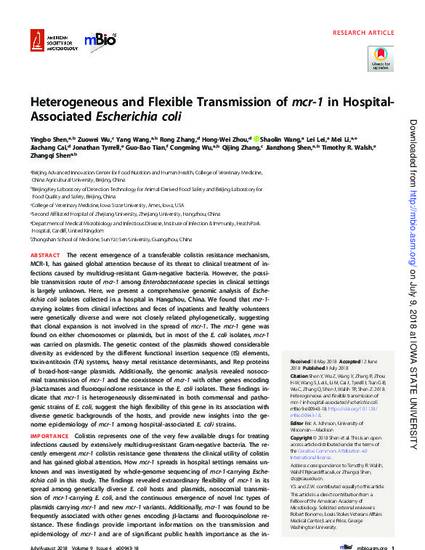
The recent emergence of a transferable colistin resistance mechanism, MCR-1, has gained global attention because of its threat to clinical treatment of infections caused by multidrug-resistant Gram-negative bacteria. However, the possible transmission route of mcr-1 among Enterobacteriaceae species in clinical settings is largely unknown. Here, we present a comprehensive genomic analysis of Escherichia coli isolates collected in a hospital in Hangzhou, China. We found that mcr-1-carrying isolates from clinical infections and feces of inpatients and healthy volunteers were genetically diverse and were not closely related phylogenetically, suggesting that clonal expansion is not involved in the spread of mcr-1. The mcr-1 gene was found on either chromosomes or plasmids, but in most of the E. coliisolates, mcr-1 was carried on plasmids. The genetic context of the plasmids showed considerable diversity as evidenced by the different functional insertion sequence (IS) elements, toxin-antitoxin (TA) systems, heavy metal resistance determinants, and Rep proteins of broad-host-range plasmids. Additionally, the genomic analysis revealed nosocomial transmission of mcr-1 and the coexistence of mcr-1 with other genes encoding β-lactamases and fluoroquinolone resistance in the E. coli isolates. These findings indicate that mcr-1 is heterogeneously disseminated in both commensal and pathogenic strains of E. coli, suggest the high flexibility of this gene in its association with diverse genetic backgrounds of the hosts, and provide new insights into the genome epidemiology of mcr-1among hospital-associated E. coli strains.
Available at: http://works.bepress.com/qijing-zhang/83/

This article is published as Shen, Yingbo, Zuowei Wu, Yang Wang, Rong Zhang, Hong-Wei Zhou, Shaolin Wang, Lei Lei et al. "Heterogeneous and Flexible Transmission of mcr-1 in Hospital-Associated Escherichia coli." mBio 9, no. 4 (2018): e00943-18. doi: 10.1128/mBio.00943-18.